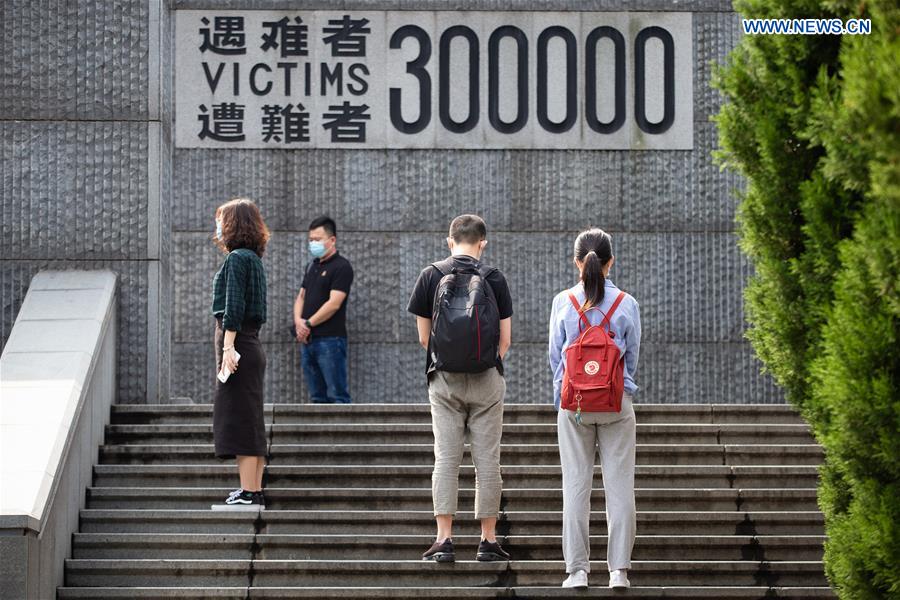Be sensitive to Nanjing's sensitivities


A senior citizen in Nanjing made a young resident take off his cosplay attire on Monday, because it had "Tokyo" emblazoned on it. His action, however, showcases more than just a generation gap. It mirrors many Chinese people's sentiments toward Japan at a time when bilateral ties are not particularly getting better.
It is not easy for residents of Nanjing, where 300,000 lives were lost in the massacre after Japanese troops captured the city on Dec 13, 1937, to so easily forget their gory past. No wonder, some senior citizens pulled up the young man for wearing the wrong costume. It's all right for the young to play cosplay games, but for someone's attire to scream "Tokyo" at a public place in Nanjing just days after the city marked the eighth National Memorial Day for Nanjing Massacre Victims on Dec 13 is certainly being insensitive.
The young sure need to be conscious about a painful chapter in history in which so many Chinese lives were lost, and doing so does not mean propagating hatred. Chinese people certainly don't hate the Japanese people. That so many young people in China are fond of the Japanese cartoon culture is proof of that.
Instead, it is some Japanese politicians and right-wing scholars who should take the blame. They have tried to whitewash history and even visited Japan's Yasukuni Shrine, which honors 14 class-A war criminals and is a symbol of Japanese militarism. Such action is irresponsible, dangerous and provocative for Chinese people. What's worse, the Japanese government toes the US administration's policy of containing China and interfering in its domestic affairs, further straining ties between the two Asian neighbors. It's high time for the hawkish Japanese politicians to correct their approach toward China and respect people's sentiments.
Yan Lun is a writer with China Daily.
Not necessary to overact to love for manga
Japanese culture has certain elements of primitive religion with some dark overtones. It could partly explain why some people still admire Japanese militarism and fascism in this modern age. However, people who support such extreme values are in a minority.
The young man in Nanjing who is at the center of attention for his cosplay was possibly just a fan of the Japanese manga genre.
Actually, it's necessary to draw a bottom line for respecting historical facts, but it's not necessary to overact to the young's simple love for manga. Accusing someone of insulting the motherland simply because he or she is fond of Japanese culture is actually going a bit too far. Such an attitude can actually push innocent young minds to the edge.
It is all right to inculcate good values in the young and make them conscious about possible wrong influences from foreign cultures. The authorities should further boost Chinese culture to make it more attractive for young minds at home and abroad.
Sun Jiashan, a researcher at the Chinese National Academy of Arts.
Beijing and Tokyo should focus on improving ties
What happened in Nanjing in the video that has gone viral since Monday — when some senior citizens made a young man take off his cosplay attire because it had "Tokyo" emblazoned on it in the Japanese manga genre — was not an isolated incident.
What the man did will any day serve as an emotional trigger for residents of Nanjing, where 300,000 lives were massacred after Japanese troops captured it on Dec 13, 1937. Just last month, the city marked the eighth National Memorial Day for Nanjing Massacre Victims on Dec 13.
While certain Japanese styles can touch a raw nerve in China, what the young man chose to wear ended up triggering intense negative emotions.
Unable to bear the sight of the provocative dress, some passersby asked him to take it off, in the same manner as parents sometimes chide a child for sporting a weird outfit in public.
There is no reason for media outlets to go overboard with it.
However, it is worth noting that China-Japan ties are going through a rough patch because of the changed international landscape, leading some Chinese people to harbor negative views about Japan. It is not surprising, therefore, that the man's costume ended up being so provocative.
Although it is unnecessary to overstate the influence of this incident, the governments of China and Japan should pay more attention to calming people's nerves and developing ties between the two nations. Such things should be discussed in a rational manner rather than drawing a hasty conclusion. Public confrontation will hinder the development of China-Japan ties.
Jin Ying, a researcher at the Institute of Japanese Studies, the Chinese Academy of Social Sciences

































